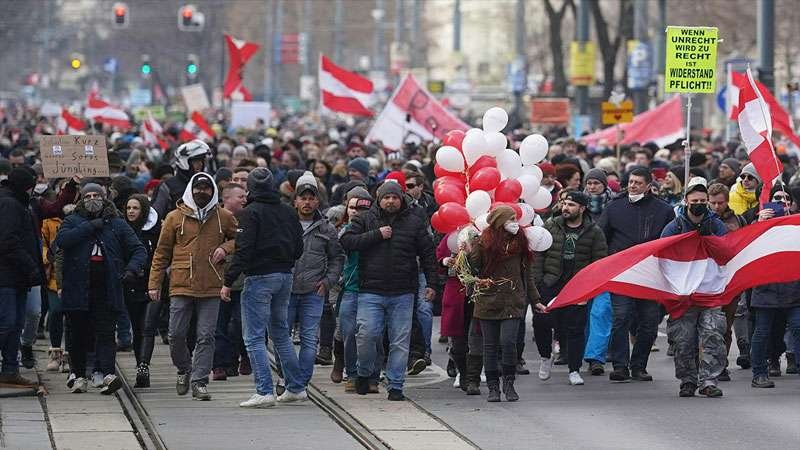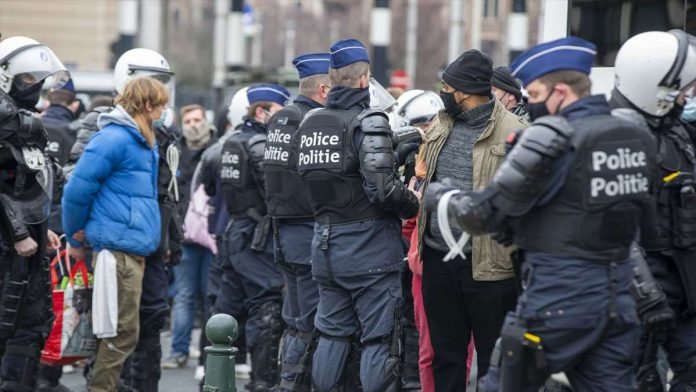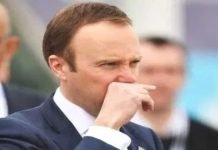Brussels police detain hundreds of anti-lockdown protesters
From Brussels to Vienna, police have clashed with scores of protesters demonstrating against COVID restrictions. Both Belgium and Austria have imposed a curfew and lockdown to fight the spread of coronavirus infections.
A police spokesman said most arrests took place around train stations in the capital, adding that those involved in the banned protests would be allowed to leave one by one after identification. Dozens of demonstrators also gathered at the Atomium, a landmark building in Brussels.
Belgium has heightened police patrols fearing a possible spill-over of protests against COVID restrictions after its neighbour the Netherlands faced violent protests and rioting in recent weeks. Last week the country banned non-essential trips in and out of Belgium until March 1.
Belgium has recorded one of the highest death rates in the world during pandemic.
The country of 11.5 million people sits at the heart of Europe and is home to the continent’s most powerful institutions. But that hasn’t stopped it from rising to the top of a list no nation wants to be on. It now has one of the highest coronavirus death rates in the world—1,385 per 1 million residents, according to Worldometer.
The country of 11.5 million people sits at the heart of Europe and is home to the continent’s most powerful institutions. But that hasn’t stopped it from rising to the top of a list no nation wants to be on
Netherlands
Last week Belgium’s neighbour the Netherlands was rocked by anti-curfew riots. On Sunday in Amsterdam, a heavy police presence thwarted a mainly peaceful but unauthorised demonstration at Museum Square.
Police said they had sent home around 600 people who had flouted social distancing rules and ignored a nationwide ban on public gatherings by assembling in Amsterdam’s central Museumplein on Sunday afternoon. There were no reports of violent incidents by late afternoon on Sunday.
The addition of a nighttime curfew to an already broad lockdown triggered last week’s violent demonstrations. Shops were looted in several cities and 500 people were arrested.
Austria

In Austria, thousands of protesters clashed with riot police in the capital Vienna at the site of a banned rally against COVID-19 restrictions.
Authorities had outlawed numerous protests planned for this weekend, including one by the far-right Freedom Party on Sunday, on the grounds that protesters have generally failed to observe rules on physical distancing and often not worn face masks.
Austria is in its third national lockdown, with non-essential shops and many other businesses closed and their staff unable to work.
An estimated 5,000 protesters gathered on a square in the city center across the road from the former imperial palace as well as from the offices of conservative Chancellor Sebastian Kurz and President Alexander Van der Bellen. Police equipped with riot gear and face masks blocked crowds from marching down the road.
Protesters were seen carrying Austrian flags and waving banners saying “Kurz must go.”
Hungary
Meanwhile, police dispersed protesters at a demonstration in Hungary’s capital, Budapest, where workers in the country’s struggling hospitality sector demanded civil disobedience and a rethinking of lockdown restrictions.
Prime Minister Viktor Orban’s government has said it could only start easing the measures if the number of cases falls sharply, or if large numbers of Hungarians are inoculated.
Hungary, with a population of some 10 million, had reported a total of 367,586 cases as of Sunday and 12,524 deaths. New infections have been dropping but more than 3,500 people are still in hospital.
Slovenia
The closure of schools in Zasavje and Obalno-kraška after they had only opened for a week following a ten-week closure brought out protesters.
Parents say they are outraged as they say rises in COVID-19 cases are actually in the nursing homes and not in the common population.
They believe that the closure of schools is causing irreparable damage to their children.
Prime Minister Janez Jansa responded, writing on Twitter that it was unreasonable and dangerous to exploit children for political purposes during the epidemic.
Support Independent Journalism Today
Our unwavering dedication is to provide you with unbiased news, diverse perspectives, and insightful opinions. We're on a mission to ensure that those in positions of power are held accountable for their actions, but we can't do it alone. Labour Heartlands is primarily funded by me, Paul Knaggs, and by the generous contributions of readers like you. Your donations keep us going and help us uphold the principles of independent journalism. Join us in our quest for truth, transparency, and accountability – donate today and be a part of our mission!
Like everyone else, we're facing challenges, and we need your help to stay online and continue providing crucial journalism. Every contribution, no matter how small, goes a long way in helping us thrive. By becoming one of our donors, you become a vital part of our mission to uncover the truth and uphold the values of democracy.
While we maintain our independence from political affiliations, we stand united against corruption, injustice, and the erosion of free speech, truth, and democracy. We believe in the power of accurate information in a democracy, and we consider facts non-negotiable.
Your support, no matter the amount, can make a significant impact. Together, we can make a difference and continue our journey toward a more informed and just society.
Thank you for supporting Labour Heartlands












